How To Find Out What Ram I Have Installed
RAM is one of the almost crucial factors influencing the speed of your computer. When you notice that your system is running slowly even though you are using a good arrangement and a fast SSD drive, you should probably examine the corporeality of RAM in your arrangement.
What is RAM memory?
Random Access Retentivity, or RAM, is a blazon of memory that is used by processors to store data that is currently being used. Examples of these include running Operating System files, device drivers, application data, etc.
As presently equally the computer is powered off, the data in RAM is erased.
Checking the consummate RAM details using WMIC command
- Type CMD in the First Menu and open the first result you go.
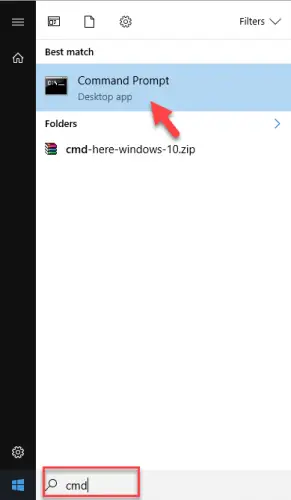
- A Control Prompt window will open. Type the "wmic MEMORYCHIP get BankLabel, DeviceLocator, Capacity, Speed " command to take the complete information about your organization's RAM. Then press Enter afterwards writing the command.
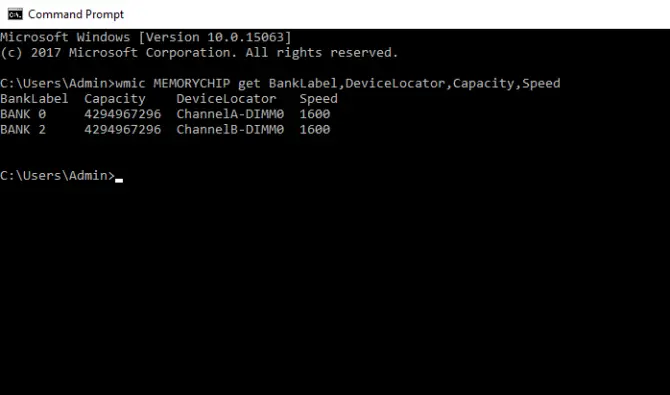
- The three columns volition be shown in front of y'all. BankLabel cavalcade will tell you which slots the RAM chips are installed in. Capacity columns will tell you that how much large each module is expressed in bytes. DeviceLocator is another entity to tell which slots the RAM chips are installed in.
- You can also become the MemoryType and TypeDetail column for your RAM to get some extra details of your RAM. To do this, enter the following command:
"wmic MEMORYCHIP get BankLabel, DeviceLocator, MemoryType, TypeDetail, Capacity, Speed".

- MemoryType tells you the type of your physical memory. In my instance, I get 24 which ways DDR 3. The value comes from TypeDetail fellow member of the Retentiveness Device construction in the SMBIOS information. I got a 128 which says my RAM TypeDetail is synchronous.
- To go complete details virtually the retentivity modules, run the post-obit control:
wmic memorychip list full
This control may not requite you lot a convenient list of details but it will definitely give y'all complete details most the hardware.
Get RAM details using systeminfo control
Hither is some other way to discover the RAM details for your system through systeminfo control.
- To detect the total physical memory of your system, enter the following command. The following command easily displays the total amount of memory which is on your system.
systeminfo | findstr /C:"Full Concrete Memory"
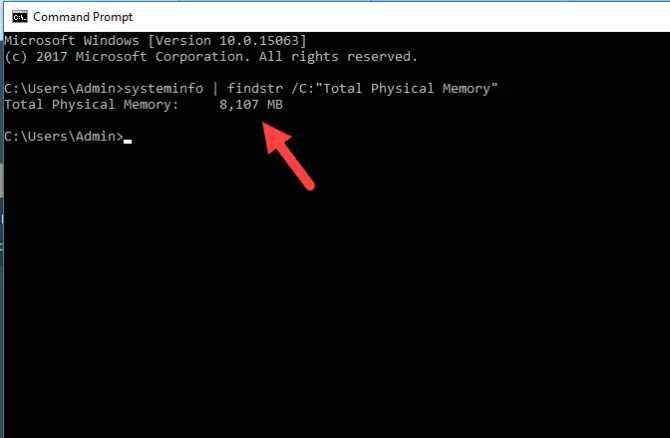
- If y'all want to go the information about the available memory of your organization and so run the following command and immediately become the event.
systeminfo |notice "Available Physical Memory"

Get RAM details using PowerShell
If you desire to get complete RAM details, you can employ the following PowerShell command:
Get-WmiObject Win32_PhysicalMemory | Format-List *
This control will give you a wealth of information near your memory.
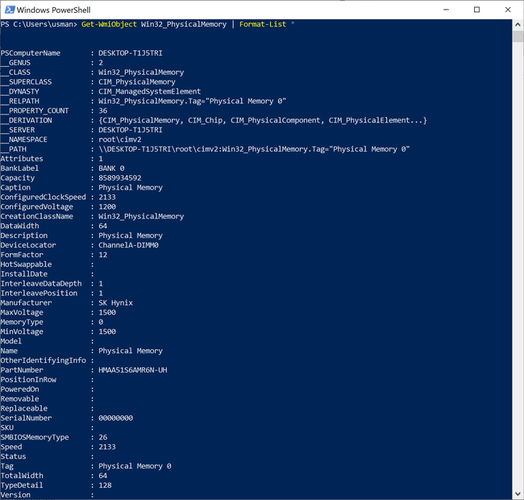
How do yous see how much RAM is in your reckoner?
You lot can easily check the details of RAM in Windows 10 using the Job Manager. The chore manager performance tab shows the majority of retention details including the total amount of RAM, how much is in employ, committed/cached and paged/not-paged amount of RAM, RAM speed and frequency, form factor, hardware reserved and even how many slots are being used in the organisation.
To check how much RAM you take on your computer, open up the Task Manager by pressing Ctrl + Shift + Esc keys and go to the Performance tab. Select Retention from the left hand pane. The right paw pane volition open RAM details.
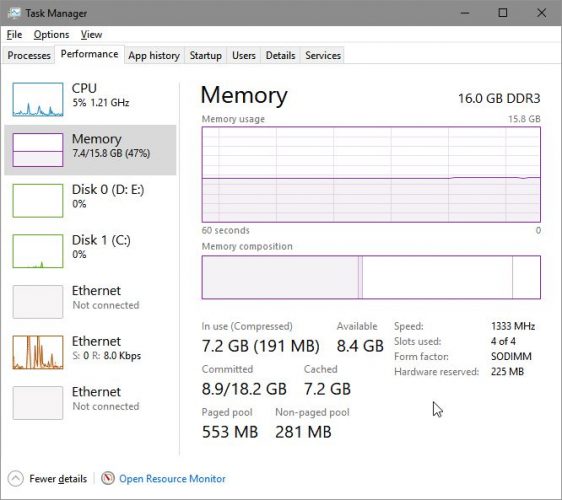
If the RAM usage is more 90%, you lot should recollect of upgrading the RAM chapters in your system, reducing the retentiveness load, and bringing it below eighty% for optimal performance.
To check how much RAM yous have using command-line, open Command Prompt and run the following command:
wmic MEMORYCHIP get BankLabel, Capacity
This will show the RAM capacity of all RAM modules separately and in bytes.
To cheque the full RAM chapters in your system, run the following command in Control Prompt:
systeminfo | find "Total Physical Memory"
This volition show you lot the total physical memory installed in Megabytes.
If you are using PowerShell, yous can run the post-obit command to go the RAM size:
Get-WmiObject Win32_PhysicalMemory | Select-Object Capacity
How to check RAM speed?
Windows 10 Chore Director gives the option to check RAM speed with ease.
To check RAM speed, open the Task Manager by pressing Ctrl + Shift + Esc keys and become to the Performance tab. Select Retentiveness from the left hand pane. On the right hand folio, y'all should see the Speed of RAM in MHz.
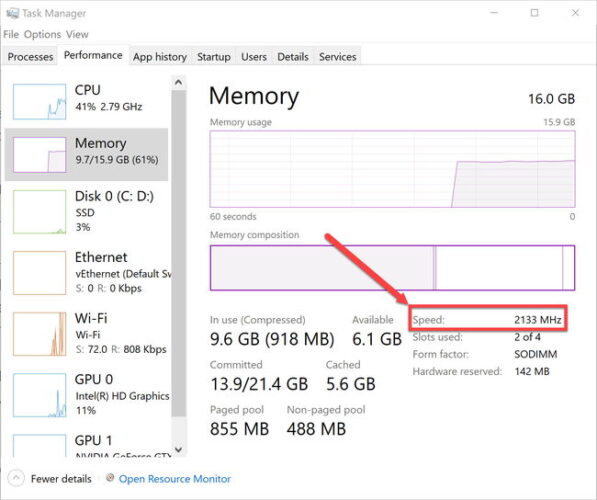
Please note that if you have multiple RAM modules, Windows ten volition written report the operating RAM speed which is the lowest of all installed modules. If you want to check the speed of each individual module, just hover your mouse cursor over the slots used. This will prove a pop-up with the speed of each module.
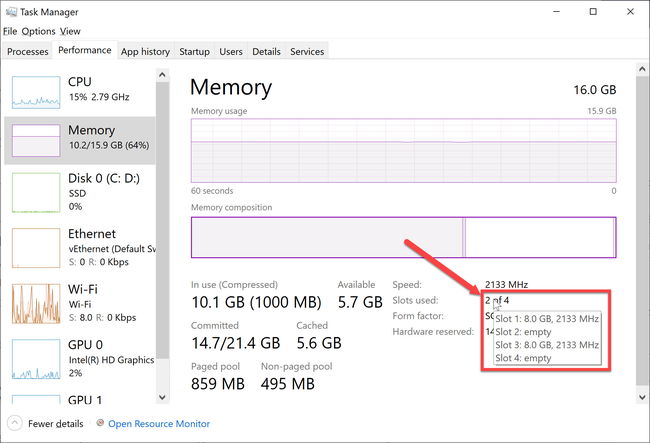
To check RAM speed using command-line, open up Control Prompt and run the following command:
wmic MEMORYCHIP get BankLabel, Speed
This will testify the speed of all installed RAM modules.
If you are using PowerShell, y'all can run the post-obit control to check the speed of RAM modules:
Get-WmiObject Win32_PhysicalMemory | Select-Object Speed
How exercise you check what type of RAM you have? DDR3 or DDR4?
Unfortunately, the Task Managing director doesn't give very useful information well-nigh the RAM type. Nosotros can use PowerShell commands to accurately determine the RAM type.
To bank check the RAM type from command-line, open PowerShell and run the post-obit command:
Get-WmiObject Win32_PhysicalMemory | Select-Object SMBIOSMemoryType
This command will give you lot a number. This number corresponds to the appropriate RAM type. Here are the codes and their respective RAM types:
| Code | RAM Type |
| 26 | DDR4 |
| 25 | DDR3 |
| 24 | DDR2-FB DIMM |
| 22 | DDR2 |
For more information on these codes, you can refer to Microsoft documentation here.
You can also use wmic MEMORYCHIP command in Command Prompt to check the memory type:
wmic memorychip get memorytype
Please note that wmic MEMORYCHIP is an one-time control and does not e'er notice the correct RAM type. If y'all see 0 as a memory type lawmaking, it means MEMORYCHIP command was not able to determine the RAM blazon.
Using commands is a very convenient, fourth dimension-saving method for any task. It is equally uncomplicated as typing a command and getting the task done. Employ the commands I described above to get detailed information about your RAM. Upgrade the RAM if your system is slow or has insufficient RAM, so that all operations will exist performed smoothly and rapidly.
Also see:
Source: https://www.itechtics.com/2-ways-check-ram-details-command-line-windows-10/
Posted by: wellsarmand.blogspot.com


0 Response to "How To Find Out What Ram I Have Installed"
Post a Comment